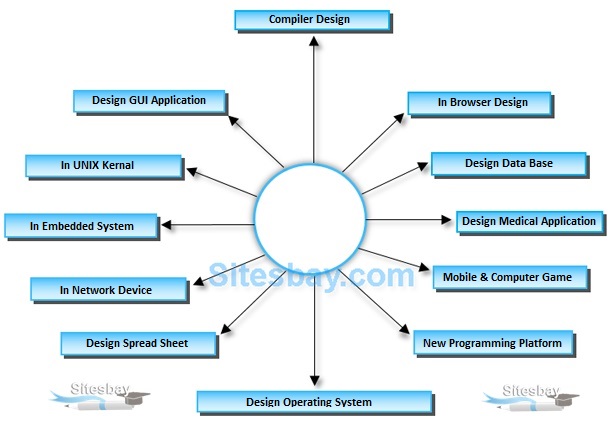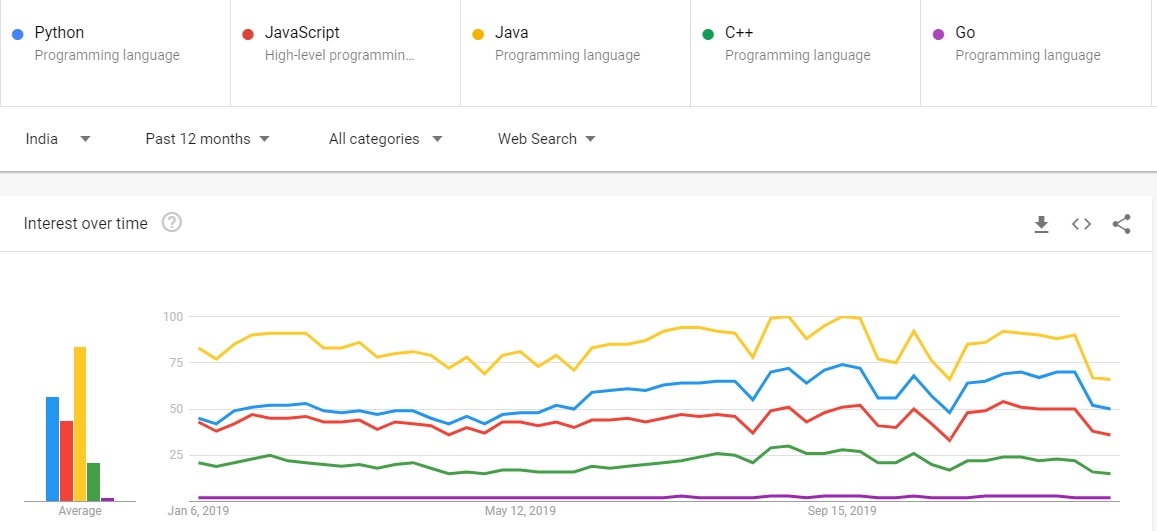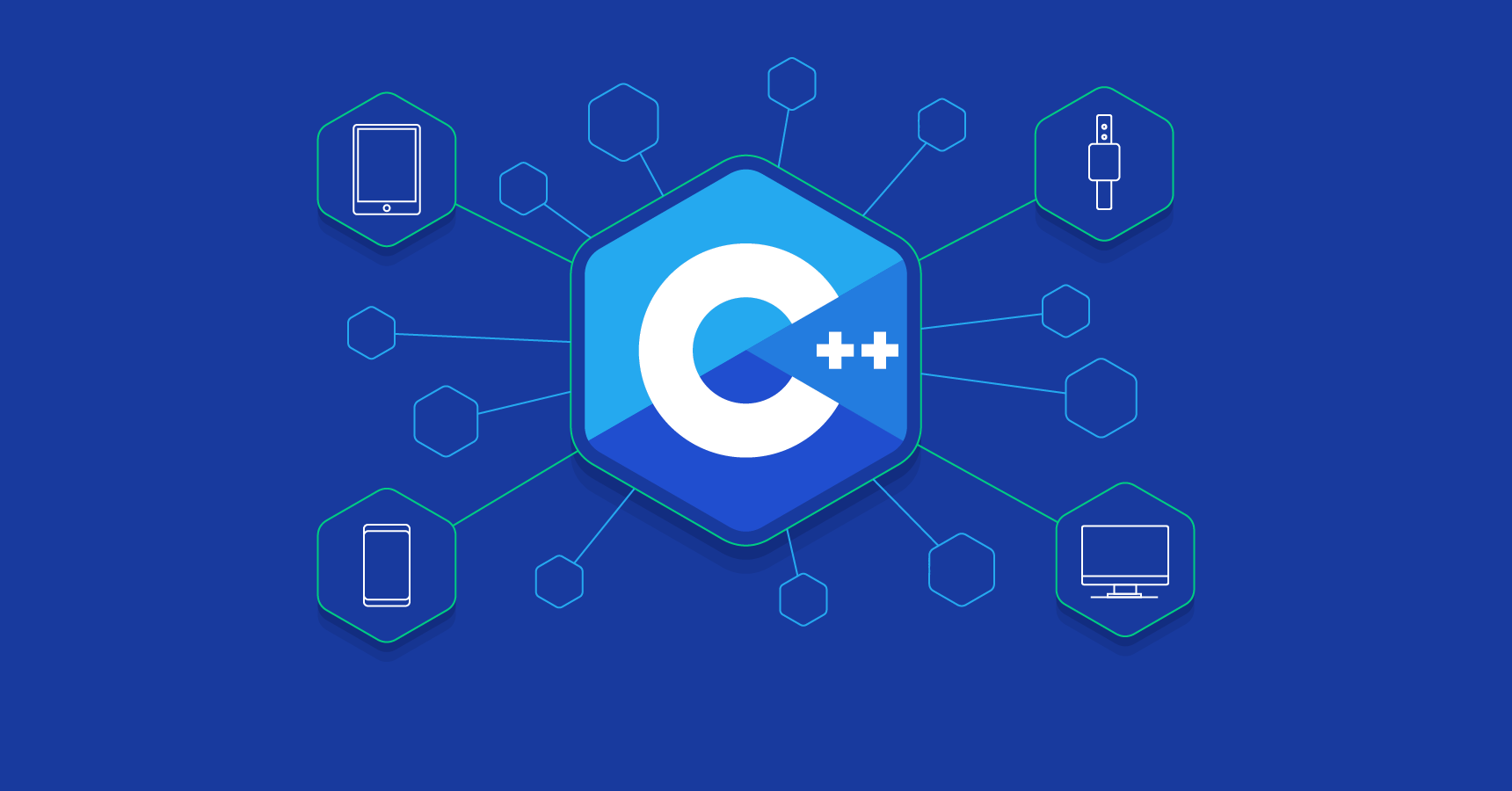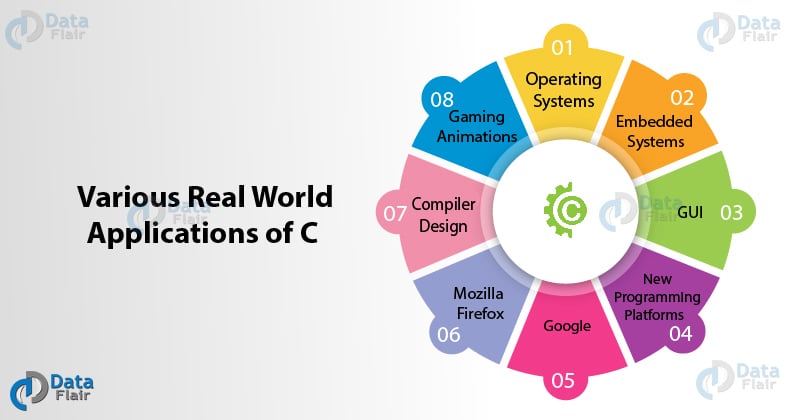Step towards C >programming
What is C-programming?
Introducing to C >>> programming
C is a general-purpose programming language that is extremely popular, simple and flexible. It is machine-independent, structured programming language which is used extensively in various applications.
C was the basic language to write everything from operating systems (Windows and many others) to complex programs like the Oracle database, Git, Python interpreter and more.
It is said that 'C' is a god's programming language. One can say, C is a base for the programming. If you know 'C,' you can easily grasp the knowledge of the other programming languages that uses the concept of 'C'
It is essential to have a background in computer memory mechanisms because it is an important aspect when dealing with the C programming language.
>>> Origin of C language:
The base or father of programming languages is 'ALGOL.' It was first introduced in 1960. 'ALGOL' was used on a large basis in European countries. 'ALGOL' introduced the concept of structured programming to the developer community. In 1967, a new computer programming language was announced called as 'BCPL' which stands for Basic Combined Programming Language. BCPL was designed and developed by Martin Richards, especially for writing system software. This was the era of programming languages. Just after three years, in 1970 a new programming language called 'B' was introduced by Ken Thompson that contained multiple features of 'BCPL.' This programming language was created using UNIX operating system at AT&T and Bell Laboratories. Both the 'BCPL' and 'B' were system programming languages.
Value of C language
'C' is a powerful programming language which is strongly associated with the UNIX operating system. Even most of the UNIX operating system is coded in 'C'. Initially 'C' programming was limited to the UNIX operating system, but as it started spreading around the world, it became commercial, and many compilers were released for cross-platform systems. Today 'C' runs under a variety of operating systems and hardware platforms. As it started evolving many different versions of the language were released. At times it became difficult for the developers to keep up with the latest version as the systems were running under the older versions. To assure that 'C' language will remain standard, American National Standards Institute (ANSI) defined a commercial standard for 'C' language in 1989. Later, it was approved by the International Standards Organization (ISO) in 1990. 'C' programming language is also called as 'ANSI C'.
Applications and uses of C programming
C Programming is a best-known programming language. C Programming is near to machine as well as human so it is called as Middle-level Programming Language. C Programming can be used to do a verity of tasks such as networking related, OS related.
C language is used for creating computer applications. It is used in writing Embedded software, Firmware for various electronics, industrial and communications products which use micro-controllers. It is also used in developing verification software, test code, simulators etc. for various applications and hardware products. For Creating Compiles of different Languages which can take input from other language and convert it into a lower level machine dependent language. C is used to implement different Operating System Operations. UNIX kernel is completely developed in C Language.
C was initially used for system development work, in particular, the programs that make-up the operating system. Why use C? Mainly because it produces code that runs nearly as fast as code written in assembly language. Some examples of the use of C might be:
- Operating Systems
- Language Compilers
- Assemblers
- Text Editors
- Print Spoolers
- Network Drivers
- Modern Programs
- Data Bases
- Language Interpreters
- Utilities
In recent years C has been used as a general-purpose language because of its popularity with programmers. It is not the world's easiest language to learn and you will certainly benefit if you are not learning C as your first programming language! C is trendy (I nearly said sexy) - many well-established programmers are switching to C for all sorts of reasons, but mainly because of the portability that writing standard C programs can offer.
Top 10 Best C Courses Online to Boost Your Skills
Table of Contents
The C programming language is one of the oldest surviving programming languages. During its run, the senior member of the programming fraternity has influenced a wide range of modern programming languages, such as Java, PHP, and Python, and is continuing to do so even today.
Although over 4-and-a-half decades old, the C programming language is an indispensable part of many fields, including gaming, robotics, and electronics. So, is it worth learning the C programming language? Of course, it is!

Best C Courses to Learn
However, having the ability to code in other programming languages will better your future prospects. So, whether you’re looking to start fresh with C or looking to advance in the same, here is our pick of the 10 best C courses available as of now:
1. Advanced C Programming: Pointers
Type – Tutorial
Level – Advanced
The Advanced C Programming: Pointers course is created by Huw Collingbourne to enable learners to master the concepts of pointers, addresses, and memory allocation in C. With a flashy rating of 4.6 stars, over 6k students have enrolled for the C course so far.
For the convenience of non-English speakers, the Advanced C Programming: Pointers course offered by Udemy is also available in Indonesian, Italian, Polish, Romanian, and Thai languages. Like other Udemy courses, you get lifetime access to the course post the purchase.
The Advanced C Programming: Pointers course comes with 4 hours of on-demand video and 7 articles. Moreover, 7 downloadable resources are also available for enhancing the learning experience. Post successful completion, learners are awarded a certificate of completion.
Topics covered:
- Common pointer errors
- Deep and shallow copying
- Generic pointers and casts
- Indirection and multiple indirections
- Memory allocation and relocation
- Pointer arithmetic
- Pointers and addresses
- Singly and doubly linked lists
- Stacks and queues
2. C Programming For Beginners – Master the C Language
Type – Course
Level – Beginner
The C Programming For Beginners – Master the C Language course offered by Udemy will help you quickly learn the C programming language and increase your career options. It is one of the best-selling courses on Udemy with a 4.4-star rating and over 24k enrollments.
The C course is jointly created by Jason Fedin and Tim Buchalka’s Learn Programming Academy. In order to allow non-English speakers to benefit from the comprehensive beginner C course, it is put at offering in 7 non-English languages, including French, Indonesian, Polish, and Romanian.
The C Programming For Beginners – Master the C Language course begins with C fundamentals and completes with tips on writing high-quality code. The 129 lectures in the course translate to 22.5 hours of video that you can traverse the way you find it the most comfortable.
Topics covered:
- Arrays
- Basic concepts and features of the C programming language
- Character strings
- Control flow
- Debugging
- File input and output
- Functions
- Operators
- Pointers
- Structures
- The Standard C library
- Variables and data types
3. C Programming For Beginners
Type – Tutorial
Level – Beginner
The C Programming For Beginners course aims to educate learners about the C programming language in 10 easy steps. You are free to use any of the three major operating systems i.e. Linux, macOS, or Windows for learning C with this Udemy course.
Created by Huw Collingbourne, the C Programming For Beginners course has an average 4.1-star rating from over 2.9k reviews. Thus far, the course has been taken by over 19k learners. The beginner C course is also available in Indonesian and Thai languages other than English.
The C Programming For Beginners course includes 6 hours of on-demand video divided into a number of lectures. Moreover, the C course comes with 1 article and 3 downloadable resources to further assist learners in picking up pace with the C programming language.
Topics covered:
- Arrays
- Binary files and memory allocation
- C editors and IDEs
- C programming basics
- Chars, strings, and pointers
- Constants and variables
- Data types
- File handling
- Functions and arguments
- Header files and scope
- Looping and the break statement
- Operators, tests, and user input
- Structures and the enum data type
- The Switch statement
4. C Programming with Linux
Type – Professional certificate
Level – Beginner
For those aiming for professional certification in programming with C on the Linux platform, the C Programming with Linux is the go-to option. Offered by edX, the C course has two instructors; Petra Bonfert-Taylor, a professor, and Rémi Sharrock, an associate professor.
The C Programming with Linux course includes 7 graduate-level courses to educate learners about the C programming language as well as the Linux platform. Although it is a self-paced program, the maximum duration to complete the course is 4 months.
Anyone looking to work in embedded systems or high-performance computing must be well acquainted with the C programming language and the Linux platform. Hence, the C Programming with Linux course offers such people the opportunity to kill two birds with just one stone.
Topics covered:
- Compiling C code with Linux
- Developing code in C
- Debugging C code
- Developing computer algorithms
- Fundamentals of C, programming, and the Linux platform
- Managing processes, files and memory with C
- Manipulating the command line
- Using pointers in C for manipulating, observing, and optimizing computer memory
5. Introduction to Programming in C
Type – Video tutorial
Level – Beginner
Learn all the essential programming fundamentals with the Introduction to Programming in C course offered by coursera and Duke University. The program relies on 4 courses to produce the ability to develop efficient problem-solving algorithms and convert the same to C code in learners.
The Introduction to Programming in C course is an excellent option for those looking to enter the lucrative field of software development and other computational fields. It is a beginner level program with a flexible schedule that will take about 3 months to complete.
Other than English, the C course is also available in Vietnamese. Aside from taking the 4 courses, the learners will need to complete a hands-on project. Post the successful completion of the program and the submission of the hands-on project, a certification of completion will be awarded.
Courses covered:
- Programming Fundamentals (Course 1)
- Writing, Running, and Fixing Code in C (Course 2)
- Pointers, Arrays, and Recursion (Course 3)
- Interacting with the System and Managing Memory (Course 4)
6. Learning C
The platform provides a series of courses ranging from beginner to advanced level. You can opt to complete all the training one by one or select the one that fits your level of experience. Apart from this, there are courses specifically designed to improve your coding skills. The code clinics consist of popular coding assignments along with the solutions for practice. Upon the completion of the fundamental programs, you can choose to take the lessons based on the use of C in embedded applications to integrate your knowledge and build IoT solutions.
Type – Course
Level – Beginner to Advance
Topics Covered
- IDE installation
- Compiler
- Data Types
- Variables
- Header Files
- Functions
- Conditional Statements
- Loops
- Pointers
- Arrays
- File Handling
- Structures and the enum data type
- Typedef, struct, and unio
7. Writing, Running, and Fixing Code in C
The Writing, Running, and Fixing Code in C is a course offered by coursera in association with Duke University.
Other than English, the C course is also available in Vietnamese. It is a 100% online course that you can learn at your own pace. You need about 25 hours to complete the course, about 4 weeks in total with 6 to 8 hours of study a week. 3 instructors will help you throughout the course.
By the successful completion of the Writing, Running, and Fixing Code in C course you will be able to not only code in C but will also have a good understanding of the C compiler and the debugging process. You will have to complete a hands-on project in the end to get a certificate of completion.
Type – Course
Level – Beginner
Topics covered:
- Basics of C
- C compiler
- Code review
- Compiler errors
- Compiling overview and process
- Controlling execution
- Fundamentals of the UNIX platform
- Macros and header files
- Testing overview and process
- Types of testing
8. C Programming Tutorials
Type – Video series
Level – Beginner/Intermediate
Looking to get started with C for free? Then you should check out the C Programming Tutorials video series on YouTube. Created and curated by thenewboston, C Programming Tutorials is an assemblage of 58 videos that have garnered over 8.1 million views at the time of this write-up.
Most of the videos belonging to the C Programming Tutorials video set run for less than 10 minutes. Only a few of them are longer than 10 minutes. The biggest video in the series runs for 12 minutes and 38 seconds while the smallest runs for a mere 3 minutes and 33 seconds
The C Programming Tutorials videos series covers most of the basic/intermediate aspects of the C programming language. Hence, it has so much that someone looking to get started with C without sparing a single penny needs.
Topics covered:
- Arrays and pointers
- Basics of the C programming language
- Break, continue, and switch
- Character functions
- Creating a header file
- File operations with C
- Global vs local variables
- Looping
- Nesting if statements
- Pass by reference vs. Pass by value
- Puts and gets
- Strings and pointers
- Typecasting
9. C - Geeks for Geeks
Type – Tutorials
Level – Beginner/Intermediate/Advanced
Though not a tutorial exactly, this is an entire directory of the C programming language-related articles on Geeks for Geeks educational website. The best thing about C - Geeks for Geeks is that it has a comprehensive list of C topics that is growing continuously.
C - Geeks for Geeks is a place that has something for every C programmer or aspirant, irrespective of their skill level. You will find everything ranging from fundamentals of the C programming language to handling files with C here.
You can learn at your own pace with C - Geeks for Geeks, completely for free. Doesn’t matter if you’re already adept in C, you can still use C - Geeks for Geeks as a reference point or handbook for all your personal/professional projects.
Topics covered:
- Arrays & strings
- Control statements
- Data types
- Enum, struct, and union
- File handling with C
- Functions
- Fundamentals of C
- Input/output
- Memory management
- Operators
- Pointers
- Preprocessor
- Storage classes
- Variable declaration, definition, and scope.
10. Learning to Program in C by Jonathan Engelsma
Type – Video series
Level – Beginner
YouTube is a great place to learn almost anything, at least to get introduced to the basics. This is true for the C programming language too. Learning to Program in C is a YouTube video series created by Jonathan Engelsma, a computer scientist, programmer, and teacher.
In addition to introducing to the basics of the C programming language, Engelsma’s YouTube channel offers numerous, thoroughly explained tutorial videos about topics related to Ruby and Swift. All of them are available completely for free.
Learning to Program in C video series contains a total of 9 videos with a total run time of 198 minutes and 11 seconds. As of now, the video series has accumulated over 96k views. Each video helps the learner move a step closer to starting programming with C.
Topics covered:
- Arithmetic and logical expressions
- Basics of C
- Data types
- Dynamic memory allocation: calloc(), free(), and malloc()
- Functions: syntax, definition, local variables, call-by-value, call-by-reference, and recursion
- Input/output using putchar/getchar and printf/scanf
- Looping and branching
- Reading from and writing to files using functions from the C Standard I/O library
- Single and multidimensional arrays
- Strings and pointers
- Typedef, struct, and union





Comments
Post a Comment